- Home
- Tim Powers
More Walls Broken Page 3
More Walls Broken Read online
Page 3
“And the slide rule!” added Blaine, extending his right hand back between the front seats. “It’s university property, hand it over.”
And at that moment the woman groaned, and sat up abruptly and scrambled around onto her hands and knees. “What the hell’s going on?” she said.
Back in the cemetery, the security guard drowsed in his cart by the gates. For several minutes the only sound around the Vitrielli grave a hundred yards away was the wind in the branches.
A dusting of white frost briefly touched the raised letters and the ceramic portrait on the brass plaque, and the cold air above it rippled, and a brisk snapping briefly broke the quiet; the plaque shivered, and the agitation in the air over the grave coalesced into the outline of a man. The figure’s translucent head leaned to one side—and then the thing wavered away across the newly-shriveled grass toward the boulevard.
The van slewed from side to side before Blaine got it under control again.
“Cobb!” barked Ainsworth. “Restrain him!”
“I’m doing nothing!” Cobb almost wailed.
“Dr. Ainsworth?” said the woman. “Where are we? Is my dad here?” She glanced at Cobb and then scuttled to the right side of the van to see the driver. “Dr. Blaine!”
“You’re not deceiving us, Armand!” said Ainsworth. “Restrain him, Cobb, damn you!”
The woman quickly looked around the dim van interior. “My dad’s not here,” she said. Her voice was taut with evident control. “What’s happened? Where is he?”
“Your act is pitiful, Armand!” said Ainsworth. “Your daughter wouldn’t have known us! We’ve never met her!” To Blaine he added, “Don’t slow down, he might try to jump out.”
The woman turned to Cobb. “Is he talking on Skype or something?”
“He’s talking to you,” said Cobb miserably. “They both think you’re your father. Occupying your body after his suicide.”
“Suicide? My father? When?”
“Two months ago,” Cobb told her. Apparently she had somehow not heard about it. She and her father were said to have been estranged. “I’m sorry.”
She looked down at herself and patted her blouse and jeans. “What’s the date?” she demanded.
“Tuesday,” said Cobb, “the 8th of May.”
“2018?”
“2018,” he confirmed.
She exhaled. “Wh—are you all insane? I saw my father an hour ago! He came home from the university and went into his study—as far as I know, he’s still there!” She stretched a hand toward Cobb. “Give me your phone.”
“Don’t do it!” said Ainsworth, but Cobb handed it to her.
Her face was underlit in a frown as she tapped in a number; then it was in shadow again as she held the phone to her ear. After a few seconds Cobb heard the multiple beep and the recorded voice saying that her call could not be completed.
She lowered the phone and stared at the screen, then tossed it back to Cobb and hiked herself forward and gripped the back of the driver’s seat. “Dr. Blaine, tell me, please—what is going on here? How did I get here? Did I have a seizure or something?”
In the rear view mirror Cobb could see Blaine’s teeth bared in a grimace of indecision. “But how can you know me?” the old professor burst out. “I’ve never met you!”
She sat back on her heels. “Okay. What is this.” Quietly she went on, “You’ve been over to the house dozens of times.” She looked at the other man. “Dr. Ainsworth, you too—both of you were there for dinner on Saturday—you argued with him. I made lasagna.”
“Why are you—” began Ainsworth, but didn’t finish the sentence.
The woman jerked around to look at Cobb. “And who are you?”
“Clive Cobb, ma’am. An assistant professor. I was doing research for your father.”
“Till his suicide two months ago, I suppose!”
All Cobb could do was shrug and nod. “You’re, uh, his daughter?” he said. “I mean, I gather you are.”
“Yes. Meditation Allegra Vitrielli.” Speaking more loudly toward the front of the van, she added, “Not Armand Antonio Vitrielli, you—pair of—!” She shook her head and turned back to face Cobb. “Please tell me how I ended up in this damned truck or whatever it is.”
Cobb hesitated, then said, “We found you unconscious in the cemetery.” He nodded back in that direction, aware of Ainsworth shaking his head.
She stared at Cobb. “The cemetery where my father is buried, I suppose.”
“Well—yes.”
“And where,” she asked, “are we going?”
“I believe we’re taking you home.”
“That’s good, at least. What time is it?”
Cobb pushed the stem on his watch and looked at the glowing face. “Just after ten-thirty.”
“My dad will be getting worried. But I can bring him out to show you all!” Squinting to see Cobb more clearly in the dim interior of the van, she asked him, “How did I get to the cemetery?”
“I honestly don’t know.”
“Were you—” She apparently gave up on framing a useful question, and just shook her head.
Then for a full minute no one spoke—though at one point and another both the woman and Dr. Blaine opened their mouths and, after a moment, closed them, and Cobb thought he could almost hear the gears spinning furiously in everyone’s heads—and the van rattled down Chapman Avenue now, past a freeway overpass and strip malls and a car dealership lit like a carnival. Blaine steered into the left lane to turn south onto Tustin Avenue.
“He wouldn’t make up a crazy story like this,” said Blaine finally. “It makes no sense at all.”
“Maybe,” said Ainsworth, waving a hand, “a crazy story…I don’t know.”
“This isn’t the way to the house,” said the woman.
“Oh, just shut up, for the love of God,” said Blaine. “I know where you live!”
“Where’s the last place you recall being?” ventured Cobb. “Before you woke up in this van?”
“What? Oh—yes, I was going to see if the mail had come yet.”
“I mean where were you? At home?”
“Yes, where the mailbox is—and it’s north of here, why are we going south?”
“We’re going,” said Blaine in a strained voice, “to your house on La Veta, where you do live, where you have lived for many years, with your daughter. Remember?” He swung the van into a right turn so sharply that Cobb fell against the woman.
“Sorry,” he gasped, trying to pull himself away without touching her unnecessarily, “Miss Vitrielli.”
She put the palm of her hand against his chest and pushed him back to his previous position. “Everybody calls me Taysha,” she told him. “Only nuns ever called me Miss Vitrielli.” To the back of Blaine’s seat she said, “And I don’t have a daughter, on top of everything else. After this detour, will you take me back to the house, on Nohl Ranch Road? Or give me money so I can get a cab to take me there?”
“You tell her, Cobb,” said Ainsworth. “You were there to get your, your malfunctioning gate.”
“Here we are,” said Blaine, slowing and steering into the driveway of a one-story ranch-style suburban house. A new Honda Accord was parked at the right side of a driveway that extended to the left and stretched up past that side of the house. Curtains glowed yellow in a front window, and a porch light shone on a couple of wicker chairs.
Vitrielli’s daughter gave Cobb a cautious look as Blaine switched off the engine. “Tell me what?”
Blaine and Ainsworth had opened their doors and were carefully climbing down to the cement driveway.
Cobb heard the two old men outside, clopping toward the back of the van. “Oh hell, Miss—”
“Taysha.”
“Taysha. Your father’s house was torn down. It’s just cleared dirt there now.”
“Uh huh.” Her voice was flat and impatient. “Within the last hour, since I opened the gate to get the mail. Shit. Give me money for a cab.”
Cobb blinked. “Were you holding the gate? The last thing you remember, before this?”
“I wish I’d held on tighter. Who do you suppose does live here? Give me fifty, to be on the safe side. I’ll pay you back.”
Blaine or Ainsworth was fumbling at the handle on the outside of the door.
“Did you usually get the mail?” asked Cobb.
“Always, my dad would just let it pile up in the box. Fifty?”
The van’s back door was pulled open, and cold, jasmine-scented air swept through the interior. Cobb pocketed the slide rule and then hopped down out of the van and extended his hand toward Taysha.
“I’m fine,” she said crossly, and slid down to the pavement without help.
“Do you have your key?” Blaine asked her, clutching his briefcase and glancing up and down the street.
“I don’t even have a key to my actual house,” Taysha told him, “I wasn’t planning to go out.”
Blaine hissed through his teeth and hurried up the steps to the front door.
It was pulled open before he could try the knob, and a woman was standing just inside, staring out at them, backlit by the flickering glow of a television. She wore a housecoat over a sweater and a plaid skirt, and her dark hair was pulled back in a pony tail, but she was otherwise identical to Meditation Allegra Vitrielli.
Blaine and Ainsworth simply stood there speechless, so Cobb cleared his throat and stepped forward.
“Ms. Vitrielli?” he said.
“Gorba,” said the woman in the doorway. “It used to be Vitrielli. What is it?”
Cobb heard Taysha whisper, “Gorba?”
He took a deep breath. “We’re from Cal State, the university, Ms., ah, Gorba. I’m Clive Cobb, an assistant professor in the Consciousness Research Department, and these gentlemen are colleagues of your—of Armand Vitrielli.” He waved toward the two old professors.
The taller of them glanced hesitantly at Cobb, then gave the woman a flickering smile, and bowed. “Dr. Aubrey Blaine, head of the department.”
The woman nodded uncertainly. “You were in the paper, in the article about him.”
Ainsworth still hadn’t managed to straighten up all the way. He hunched forward, nodded, and said, in a scratchy voice, “Dr. Peter Ainsworth, ma’am—Dr. Peter Ainsworth—we’re—we hoped to—we should have called first—”
Taysha edged past Ainsworth into the light. “And I’m Meditation Allegra Vitrielli.”
Gorba opened her mouth but didn’t say anything. Warm air from behind her carried the smell of—Cobb sniffed—yes, it seemed to be lasagna.
Cobb spread his hands. “Could we come in?”
Gorba was staring at Taysha. “Are you supposed to be my twin or something?”
“That’s the only thing that makes sense,” said Taysha. Her arms were down at her sides, her fists clenched. “And I do mean the only thing. What’s your name? Your maiden name.”
“What you just said. Meditation Allegra Vitrielli. Uh—people call me Allegra.”
“Why would he name us both the same?” Taysha glared at Blaine and Ainsworth, then looked again at Allegra. “I’m called Taysha, generally.”
Allegra slowly raised her hand and bit her knuckle. “My father used to call me that.”
“Could we come in?” repeated Cobb.
“He’s dead,” said Allegra softly. “These two months I’ve just wanted closure…”
“He’s not dead where I come from,” said Taysha.
Cobb’s chest suddenly felt coldly hollow, and his pulse was ringing in his ears. “God help us,” he whispered; then more loudly he said, “I think that’s the point.” He raised his eyebrows at Allegra.
Allegra dropped her hand and looked past them at the empty dark street, clearly wishing it had not yielded up this crazy, unexpected entanglement. At last she sighed and stepped back, opening the door more widely.
Because no one else moved, Cobb stepped up onto the porch, then walked past Allegra into a living room lit by lamps on either side of a gray fabric-covered couch to his left, and, ahead of him, a TV set mounted between drawers and shelves in a big walnut cabinet. An undersized pink bicycle leaned against one corner of the cabinet, and some CNN news show flickered on the TV screen.
The others had followed him in and were standing together on the nondescript tan rug in the middle of the room. Allegra closed the door with evident reluctance, then crossed to the low table in front of the couch and picked up a glass.
“Sit down, I guess,” she said. “I’m having a drink, and I think I’ll have another after that. Anyone else? Twin?”
“That’s Maker’s Mark,” said Taysha with certainty; and when Allegra nodded, she added, “I’ll have the same, thanks.”
Blaine had sat down gingerly on the couch, with his briefcase on his lap. “Do you have any brandy?”
“Bourbon,” said Allegra. She pursed her lips. “I could make coffee.”
“Bourbon will do,” Blaine said; and Ainsworth, and then Cobb, nodded. Allegra picked up a remote and turned off the television, then stepped out of the room.
“You said ‘that’s the point,’” said Blaine quickly to Cobb. “Tell me what you meant.”
Cobb waited, nervously considering the idea that had occurred to him a few moments ago, while Allegra clanked things around in the kitchen; she came back, set a squat bottle and a bowl of ice on the table and returned to the kitchen. This time she reappeared with four glasses. She moved her own drink to a desk in the corner and sat down in the office chair in front of it.
“I turned off the oven,” she said. “I’m afraid I can’t ask you to stay for dinner. My daughter is due home any time, and I don’t want her—”
“You lay the pasta strips down dry, right?” interrupted Taysha. “So they boil right in the lasagna while it bakes.”
“That’s how he…” Allegra sighed and looked at the ceiling.
Ainsworth lowered himself onto the couch beside Blaine. Cobb and Taysha remained standing.
“Well?” said Blaine to Cobb.
“Okay.” Cobb gave Allegra an apologetic, self-conscious glance. “Okay, this will sound crazy, I’m sorry, but—remember the sort of work your father did.” He took a deep breath. “The three of us,” he said, waving toward the couch, “were in Holy Sepulchre cemetery tonight, trying to summon up the ghost of Armand Vitrielli.” He had had to raise his voice in the middle of the sentence, for Ainsworth had begun sputtering and perhaps trying to get up. The two women were just frowning at Cobb as if he’d made an obscene joke. “The procedure,” Cobb went on doggedly, “required, among other things, some metal object that Dr. Vitrielli would have handled a lot, and I had fetched the chain-link gate that used to be at the bottom of his driveway.”
“He’s lying,” said Blaine, “or crazy, poor fellow. Obviously. We never—”
“But instead of a ghost,” Cobb went on, overriding him, “Taysha appeared, unconscious. From nowhere, out of thin air! These two…old fools, to put it kindly, decided that Dr. Vitrielli had taken over her body, and so by catching her they had caught him after all.”
“They did think that,” said Taysha. “Idiots.”
Cobb looked across the room at Allegra. “When’s the last time you touched that gate?”
Allegra’s mouth had sagged open and her eyes darted from the old men on the couch to Taysha; at last she focused on Cobb. “What? The gate down by the driveway? What on earth are you talking about?” When Cobb didn’t answer, she shrugged and said, “Not since I moved out, twelve years ago.”
“Taysha, though,” resumed Cobb, “handled it every day—was holding it only about half an hour ago—in the real, divergent reality she came from. Universe, say.” Everyone began talking, or at least exclaiming, and Cobb held up his hands. “The procedure!—designed by your father,” he said to both women, “—was supposed to cleave a gap in our reality, open a trap-door, so to speak, and effect the transmigration of a soul connected to that old
chain-link gate, from one world to another. It did.” He suppressed a crazy urge to giggle, and turned to Blaine. “I think tonight we inadvertently proved Everett’s ‘many worlds’ interpretation of quantum mechanics. Or at least two worlds. Think about it.”
He tried and failed to come up with anything more to say, so he just nodded in conclusion, then crouched beside the table to pour bourbon into one of the glasses. Ice? he wondered. Why bother.
Blaine closed his eyes for a moment, then opened them and put on a sorrowful smile. “Our young would-be colleague might find a better use for his imaginative skills in fiction-writing than in academia. Divergent reality, quantum mechanics! Ghost raising!” He looked toward Allegra. “I do apologize for inflicting this insensitive sophomoric vulgarity on you, and at such a time. No, I think the truth is more mundane—and sad.”
He now looked earnestly up at Taysha. “Of course you didn’t…appear out of thin air in a graveyard tonight! Really, does that story make any sense at all? I’ll charitably assume Mr. Cobb is on some variety of medication, if not simply drunk.”
“Then what—” began Taysha.
Blaine raised a hand. “We found you unconscious in Dr. Vitrielli’s office an hour ago, and mistook you for this woman who lives here. I think it’s clear that you are…an unacknowledged daughter of our departed colleague. In your grief at the death of your father, you’ve constructed this fantasy that he’s still alive, and you’ve taken on yourself the delusion that you are in fact this woman, your half-sister—his acknowledged daughter—whom, unfortunately facilitating your fantasy, you do closely resemble.” He raised one stern white eyebrow at Cobb. “And it’s cruel of you, sir, to carelessly encourage her with your, your whimsical imaginings!”
Allegra seemed to find all this convincing; she was looking with evident interest and sympathy toward Taysha—who had backed away toward the front door.
Her eyes were narrowed and she was breathing deeply. Looking past Cobb at Allegra, she asked hoarsely, “Did he really die two months ago? Killed himself?”
“I’m sorry! He did!”

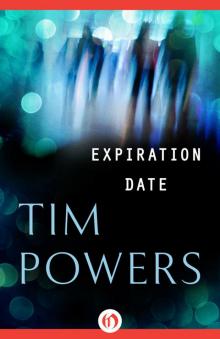 Expiration Date
Expiration Date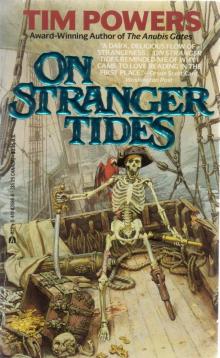 On Stranger Tides
On Stranger Tides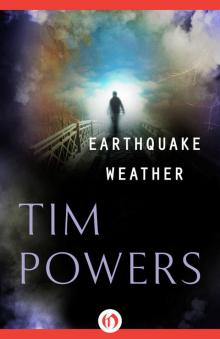 Earthquake Weather
Earthquake Weather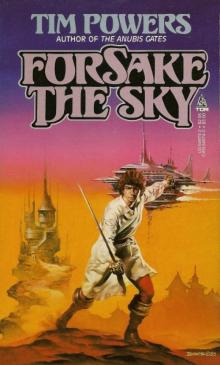 Forsake the Sky
Forsake the Sky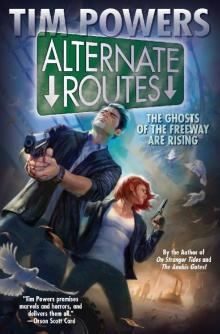 Alternate Routes
Alternate Routes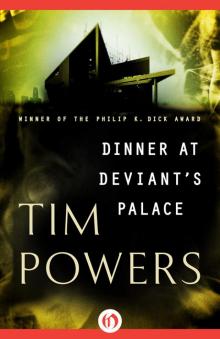 Dinner at Deviant's Palace
Dinner at Deviant's Palace The Stress of Her Regard
The Stress of Her Regard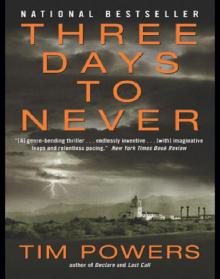 Three Days to Never: A Novel
Three Days to Never: A Novel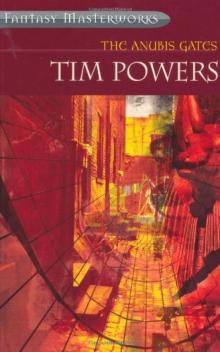 The Anubis Gates
The Anubis Gates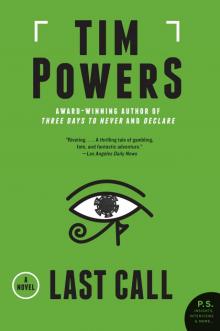 Last Call
Last Call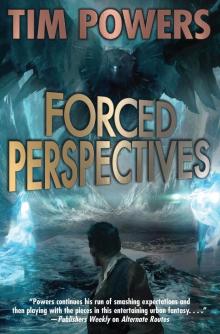 Forced Perspectives
Forced Perspectives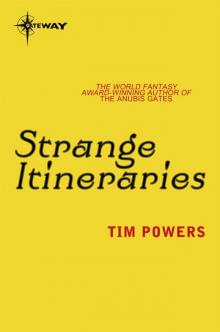 Strange Itineraries
Strange Itineraries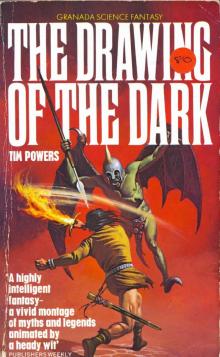 The Drawing of the Dark
The Drawing of the Dark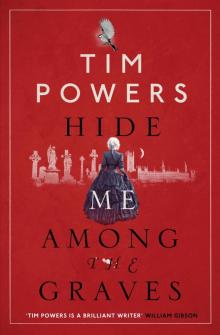 Hide Me Among the Graves
Hide Me Among the Graves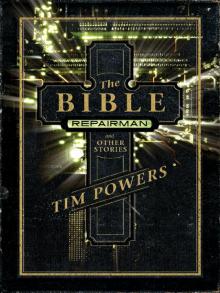 The Bible Repairman and Other Stories
The Bible Repairman and Other Stories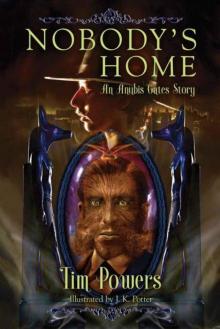 Nobody's Home: An Anubis Gates Story
Nobody's Home: An Anubis Gates Story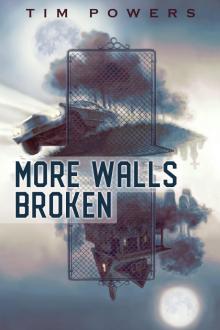 More Walls Broken
More Walls Broken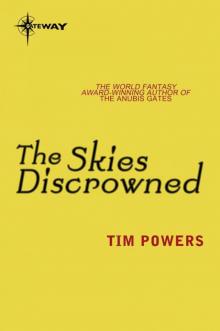 The Skies Discrowned
The Skies Discrowned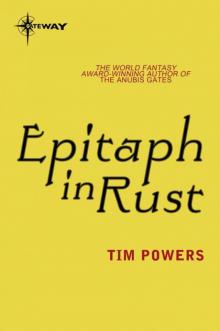 Epitaph in Rust
Epitaph in Rust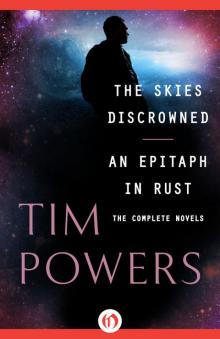 Skies Discrowned and An Epitaph in Rust
Skies Discrowned and An Epitaph in Rust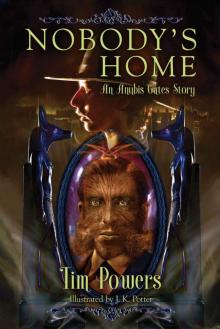 Nobody's Home
Nobody's Home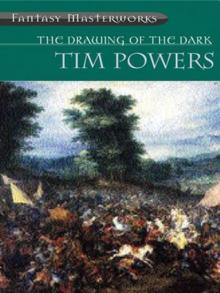 Drawing of the Dark
Drawing of the Dark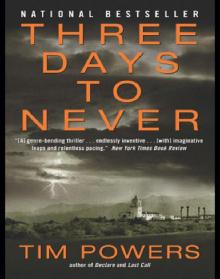 Three Days to Never
Three Days to Never